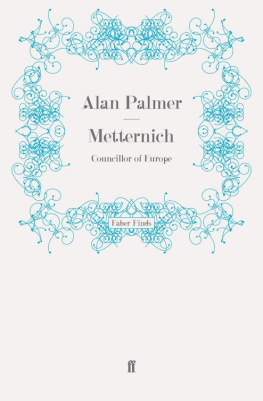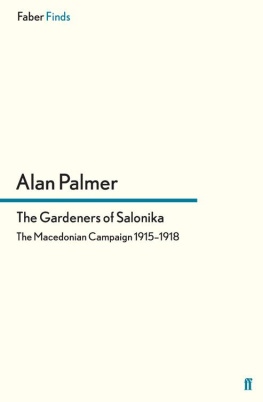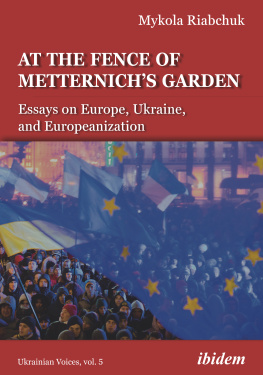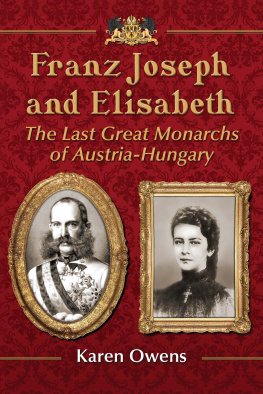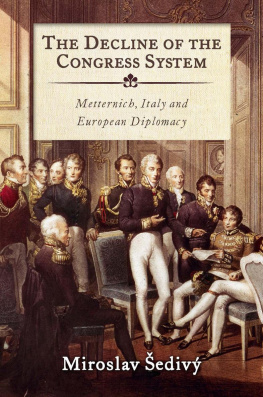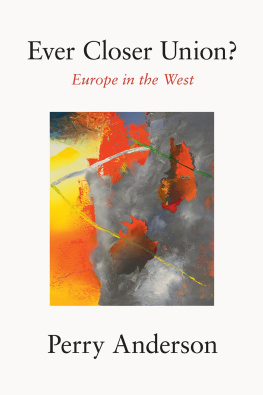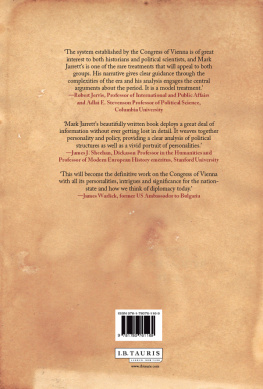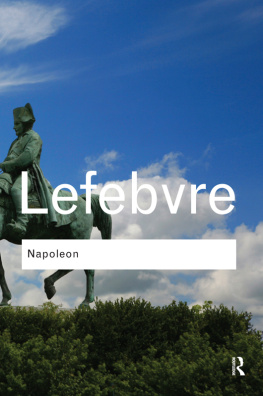Clement von Metternich held continuous office at the head of Europes affairs for a longer period of time than any other statesman in modern history: he became foreign minister of the Austrian Empire in the autumn of 1809 and he did not resign until the spring of 1848. For thirty-three of these thirty-nine years his statecraft and philosophy of government determined the political pattern of the continent. The Age of Metternich, though often impatiently dismissed by historians as a mere interlude, lasted for twice as long as the Age of Napoleon which preceded it and for half as long again as the Age of Bismarck which followed it in the closing decades of the century. Moreover Metternichs actual participation in public events covered an even wider span: in 1790 he performed official duties during the coronation of Leopold II as Holy Roman Emperor of the German Reich; and in 1859 his advice on questions of war and peace was still being sought by Leopolds great-grandson, Francis Joseph. On his first visit to London, in 1794, he was entertained by the Prince of Wales, the future George IV ; and on his penultimate visit to the Rhineland, sixty-three years later, he was able to offer his choicest wines to another Prince of Wales, the future Edward VII . Metternichs mother had known Maria Theresa at the height of Habsburg splendour: his youngest daughter was to outlast the Habsburg Monarchy itself.
Yet, whether playing a leading part in Europes drama or walking-on before its colourful backcloth, the Metternichs rarely won a good notice from the critics. The haughty superiority of father and son was mocked in the French press as early as 1798, and cartoonists half a century later were no kinder to the fallen Chancellor and his third wife as they sped across the continent to exile in England. More, however, was at fault than character. The incredible vanity of the Metternichs might merit an occasional lampoon but not the endless pages of hatred and contempt with which European radicals assailed their name over four decades. Such sustained vituperation was a direct consequence of Clement Metternichs policy rather than of his failings in personality. As early as 1820 he was regarded as the pillar of an international order which perpetuated autocracy and denied sovereignty to peoples striving for recognition; and for thirty years the so-called Metternich System was associated with repression of civil liberty and with negative government. A generation easily thrilled by the collective emotion of Romantic revolt could never look on Metternichs conservative classicism with sympathy or understanding. He seemed urbanely doctrinaire in a world of stifled enthusiasm, and few people warmed to his philosophy.
Metternichs unpopularity is hardly surprising. He set himself against the prevailing mood of his age and of the half-century which followed his death. While accepting the existence of territorial States and striving for guarantees of their stability, he could never acknowledge the claims of a Nation. He rejected the idea that community of language, sentiment or race provided a basis for political unity; and he insisted that representative government was a weak and unsatisfactory method of administration which restricted the initiative of those in power while permitting unwarranted authority to a popular demagogue. Though he respected the traditional rights of ancient institutions, such as the British Parliament or the Hungarian Diet, he was convinced that constitutional forms were neither for export nor for emulation. Nationalism and Liberalism remained equally abhorrent doctrines to him, the product of that French Revolution against which he saw himself in conflict throughout his life. In their place he evolved a cumbersome set of political principles, pompously propounded over the years in earnest memoranda heavy with profundity. He offered a threefold creed: a belief in an essential community of interest which bound together the European States; a belief in the need for vigilance against political excess; and a belief in the virtues of a balanced order, both between governments and between classes within society. These ideas were based upon a haphazard search for immutable laws of political behaviour and none of them were in the least original, for they seem to owe something to Voltaires Great Republic and even more to Aristotle; but they provided Metternich with a code of respectable obscurity in which he might envelop what was basically a day-to-day and hand-to-mouth policy.
Yet Metternich was not primarily a theorist nor even a constructive statesman. Though he prided himself on a logical scientific approach to political problems, his gifts were those of an artist. He practised the skills of diplomacy with greater fluency than any contemporary except Talleyrand, from whom he had learnt many of the refinements of the game. But he possessed the opportunity, denied to Talleyrand, of shaping the very character of statecraft in an era of external peace. Metternichs achievements are essentially transitory, victories of intrigue rather than of creative conviction, triumphs of expediency more than of principle; but the distinctive features of diplomacy during the Hundred Years Peace were perfected by the Austrian Chancellor and passed into general usage at a time when Europes fate was determined by its chancelleries to a greater extent than ever before or since. The assumption that Great Powers together form a European Concert and share a responsibility for the international order; the acceptance of negotiation as a protracted undertaking rather than as a swiftly concluded episode; the primacy of confidential exchanges over public dispute; the persuasiveness hidden behind an elaborate comedy of manners all these aspects of what Sir Harold Nicolson has called the old diplomacy were formed while Metternich was master of its conventions , and many reflect the qualities of his own personality. To understand the idiom of his Europe, it becomes essential to understand the man.
He puzzled observers in his own age and baffled their immediate successors: how could such a lightweight sit so heavily on the world? Nineteenth-century German historians, academic lenses tinted with patriotic colours, viewed the Rhinelander who had passed into Austrian service with scant sympathy. The great Prussian scholar, Heinrich von Treitschke, writing in the 1880s, virtuously lamented his spiritual narrowness and his thorough understanding of all the meanest motives in human nature while complaining that his empty mind remained unresponsive to the dynamic forces of History. Treitschkes prejudices were perpetuated by other historians in his own country and by writers in Britain and the United States, where academic fashion at the end of the century was heavily Germanic in form. Thus a Metternich legend seeped into the general textbooks of two continents, with the Austrian Chancellor appearing as some Mephistophelian compound of trickery and harassment; and even today this distorted picture has not entirely been expunged from their pages. On the other hand, after the First World War, several historical commentators began to laud Metternichs foresight in checking the growth of nationalist fervour, some even claiming to find among his potpourri of political maxims a conservative philosophy of general validity. He was, it now appeared, an early champion of federalism and a good European, eager to offer a weary continent relief from the threat of war; and it seemed almost as if his shade was looking benevolently down on the green tables of Geneva and Locarno. This impression was at least as convincing as the older one but it was not so popular with English readers, who have long expected continental statesmen to exude a whiff of brimstone rather than an odour of sanctity.

